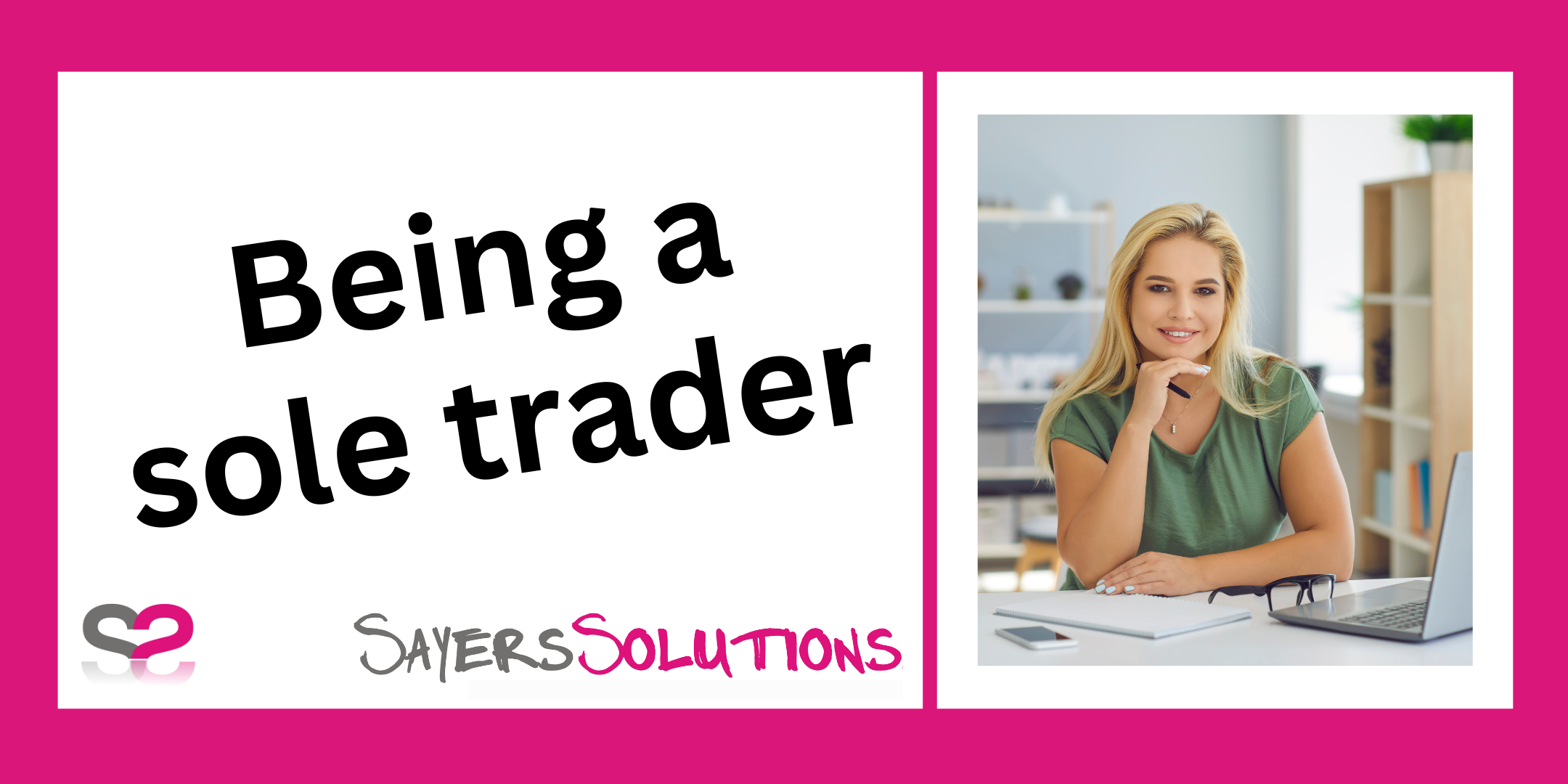Thinking about being a sole trader?

Setting up in business, there is lot to consider. One of the key questions, that perhaps not everyone asks themselves, is what legal entity to choose. Most people know about Limited companies, but there are many other options. Including being self employed and a sole trader.
Other business entities include forming a partnership, a company by limited guarantee or perhaps one of the many non-profit charitable status; CIO, CIC, Incorporated Charity for example. Whilst there are numerous types of legal entities, this article focuses on what a sole trader is.
We look at the advantages and disadvantages and then, if you still want to be a sole trader, we share with you 9 top tips for you to consider.
As a sole trader, you and your business are considered the same legal entity. While this structure offers simplicity, it also means you have unlimited liability.
You need to consider the risks and benefits, and if needed, consult with a business advisor or attorney to decide if this is the right structure for your business.
A sole proprietorship is a business structure where a single individual owns and operates the business.
Let’s have a look at the definition of a Sole Trader:
A sole trader, also known as a sole proprietor, is a type of business entity where an individual runs and operates a business on their own. Unlike other business structures, such as partnerships or corporations, there is no legal distinction between the individual and the business.
The sole trader is personally responsible for all aspects of the business, including its debts and liabilities.
This simplicity and autonomy make sole proprietorship a popular choice for small businesses and freelancers.
Now let’s have a look at the advantages and disadvantage of being a sole trader.
The advantages of being a Sole Trader are:

Ease of Formation: Setting up a sole proprietorship is relatively straightforward and requires minimal legal formalities or paperwork.
Complete Control: As the sole owner, you have full control over all business decisions, allowing for quicker decision-making and implementation.
Simplified Taxation: Sole traders report business income and expenses on their personal tax return, simplifying tax filing.
Flexibility: Sole traders have the flexibility to change the business structure or dissolve the business with ease if circumstances change.
Privacy: Unlike some other business structures, sole traders can maintain a higher level of privacy because there is no public disclosure of financial statements.
The disadvantages of being a Sole Trader are:

Unlimited Liability: One of the significant drawbacks of a sole proprietorship is that the owner’s personal assets are at risk in the event of business debts or lawsuits.
Limited Resources: Sole traders might face challenges in accessing significant funding or resources compared to larger businesses.
Limited Expertise: As a sole trader, you may have to handle all aspects of the business, which could be overwhelming if you lack expertise in certain areas.
Dependency on the Owner: The success and continuity of the business often rely heavily on the owner’s skills, knowledge, and availability.
Difficulty in Scaling: Expanding a sole proprietorship can be challenging due to limitations on resources and manpower.
Despite the disadvantages, many entrepreneurs find sole proprietorship to be an excellent starting point for their businesses.
As the business grows and becomes more complex, some sole traders may decide to transition to a different business structure, such as a partnership or a limited liability company (LLC), to mitigate personal liability and accommodate growth.
Now, you have read the advantages and disadvantages of being a sole trader, are you are still interested?
Here are 9 essential tips to help you succeed as a sole proprietor, which are self-employed individuals running their businesses:
- Business Planning: Start by creating a comprehensive business plan. Define your business goals, target market, products or services, pricing strategy, marketing approach, and financial projections. A well-thought-out plan will guide your decisions and actions, increasing the likelihood of success.
- Financial Management: Proper financial management is crucial for any business. Keep track of your income and expenses, maintain separate business and personal accounts, and set aside funds for taxes. Regularly review your financial statements to understand the health of your business and make informed decisions.
- Separate Business and Personal Finances: It’s essential to keep your personal and business finances separate. Open a dedicated business bank account to track income, expenses, and profits accurately. This practice not only simplifies accounting but also demonstrates a more professional image to clients and customers.
- Legal and Tax Compliance: Register your business with the appropriate authorities, obtain any required licenses or permits, and comply with local, state, and federal regulations. It’s essential to understand your tax obligations as a sole proprietor and pay estimated taxes quarterly to avoid penalties.
- Maintain Comprehensive Records: Keep detailed records of all financial transactions, invoices, receipts, and expenses. Good record-keeping ensures accurate financial reporting, simplifies tax preparation, and can help identify potential deductions. Consider using accounting software or apps to streamline this process.
- Customer Focus: Customer satisfaction is vital for the success of your business. Listen to your customers’ feedback, address their concerns, and strive to exceed their expectations. Building a loyal customer base can lead to positive word-of-mouth and repeat business.
- Market and Network: As a sole trader, building a strong professional network and effective marketing are crucial to attracting clients and growing your business. Utilize social media platforms, attend industry events, and engage in networking opportunities to connect with potential customers and collaborators.
- Focus on Customer Service: Satisfied customers are more likely to become repeat clients and refer others to your business. Prioritize excellent customer service, be responsive to inquiries and concerns, and strive to exceed expectations. Positive word-of-mouth can be a powerful tool for a sole trader’s success.
- Time Management and Work-Life Balance: As a sole proprietor, you’ll likely have numerous responsibilities to handle. Manage your time effectively, prioritize tasks, and avoid burnout. Remember to take breaks and maintain a healthy work-life balance to sustain your productivity and well-being.
Remember that running a sole proprietorship can be both rewarding and challenging.
Staying organized, adaptable, and committed to continuous improvement will help you navigate the journey successfully.
Seeking advice from mentors or business support networks can also be valuable in your entrepreneurial endeavors.
Remember, being a sole trader requires dedication, discipline, and a passion for what you do.
Seek support from fellow entrepreneurs or business communities, and don’t be afraid to seek advice from professionals when needed.
By following these tips and maintaining a proactive approach, you can increase your chances of building a thriving and successful sole trading business.
Bonus Tip: Continuous Learning and Self-Improvement: Stay updated on industry trends, market changes, and new technologies.
Invest in personal development and acquire new skills that can enhance your offerings and efficiency.
As a sole trader, your success depends on your ability to adapt and grow in a dynamic business environment.
But don’t worry, you don’t have to do all this alone. There are plenty of networks out there, waiting to support and help you. There are hundreds of events and opportunities to build your network. Its then about you building your own network. Forging relationships with people and working together.
Sayers Solutions can help you. As an established small business support organisation and highly networked, we can help you work through the steps of being a sole trader, whether you are at the start of your journey or reevaluating your progress.
We can connect you with the right partners to work with and guide you through making introductions and building the relationships. We can be at hand to discuss projects, and even attend meetings with you. We can also broker the relationship between you and the partners, if that’s what’s needed.
There are other aspects like running the marketing communications and other marketing focused activities, that we could help you with. Sayers Solutions is here to help.
Why not get in touch for a Suggestion Session or look to book on our Marketing Bootcamp and be put through your paces.






